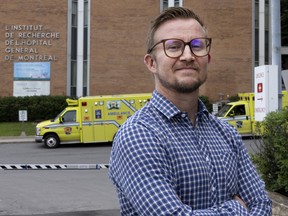The RI-MUHC study was published a few days before Canada warned Thursday that the opioid crisis was exacerbating.

New research by a team of researchers at Magill University suggests extensive coverage opioids after mild surgery Prescribing is more harmful than good to the patient.
The study, published a few days before the Canadian Public Health Department warned that the opioid crisis was worsening in the country, often does not require preoperative drug prescriptions. And concluded that there was little benefit.
"Surprisingly, our results showed that the opioid prescription did not reduce the pain reported by the patient," said Dr. Julio Fiore.
This study, conducted by the Institute of Health Center at Magill University, compared 47 cases in which patients were prescribed opioid or opioid-free options to control postoperative pain levels. It is a combination of the results of clinical trials.
Most of the studies reviewed have targeted patients undergoing minor procedures such as dentistry or described as moderate procedures including orthopedics and general surgery. ..
As a result of the analysis, in many surgeries, even if opioids were prescribed, the intensity of pain reported by the patients was higher than that of patients who used the over-the-counter option. It turns out that it was not alleviated.
Also, by choosing an alternative, you can avoid the adverse effects of recovering opioids such as nausea, vomiting, and drowsiness, and prevent you from becoming a chronic opioid user afterwards. I concluded.
There is also the question of whether opioid crisis can be mitigated by moving away from post-surgery opioid overprescription.
This study cites a study showing that 6% of patients who are first prescribed opioids after surgery may be dependent. Even 70% of the prescribed opioids are initially unused and may later be used for the wrong reason.
In previous studies, opioid crisis repulsion caused some doctors to hesitate to prescribe opioids to relieve pain,health of patients with chronic pain. When asked about the crisis, Fiore suggests that this study manages postoperative acute pain, not the case of patients dealing with chronic pain. He said he is focusing on the use of opioids to do this.
"Of course, opioid crises have a variety of causes, not just caused by surgeon overprescription," Fiore said, making it important to ensure proper pain management for patients. Pointed out.
"But reducing dependence on opioids for the treatment of surgical pain is definitely a step in the right direction."
A new report released Thursday. So, the Canadian public health sector warned last year that opioid-related deaths reached new levels across the country. On average, there are 21 such deaths daily in Canada, compared to eight people just five years ago.
The crisis remains the most serious in the western states, but Quebec is not protected from it either.
According to the Institut Nationaldesantépublique du Québec (INSPQ), 547 opioid and other drug addiction deaths were suspected in the state between April 2021 and March this year .. In March alone, 52 people died. In an interview with
, Jean-François Mary,Managing Director of CACTUS Montreal, a safe injection facility, said the crisis has been largely ignored by Quebec authorities.
Mary said Quebec has not recorded deaths from overdose at least once a day, not a month since September 2019.
Still, he added, the state government has not promised new funding to combat the epidemic or updated its public health strategy on this issue.
Mary said opioid prescriptions should be limited to patients who really need it and are used "in a very generous way for all types of cases". I agreed that it shouldn't be.
However, he also warned that doctors should never avoid prescribing opioids for fear of contributing to the crisis.
What he sees in CACTUS is the negative effect of what he described as an opioid underprescription. For example, people who need opioids for debilitating pain look to the black market if possible. Please get a prescription.
Last week, center workers had to intervene after someone bought a counterfeit Dilaudid, an opioid analgesic, to relieve pain.
The person overdose, Mary said, and he would be dead today if they didn't know they were going to the center.
"We are constantly calling from patients who have seen legitimate prescriptions reduced. They don't want to go to the black market, Faced with their pain, they have no choice, "Mary said.
"If no one wants to prescribe what they need, they'll find another way to get it anyway," he added. "And it's very problematic."
jfeith@postmedia.com
twitter.com/jessefeith


